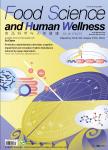Fucoxanthin improves serum lipids, liver metabolism and gut microbiota in hyperlipidemia mice
作者机构:Faculty of Environment and Life Beijing University & Technology Shenzhen Key Laboratory of Marine Microbiome Engineering Institute for Carbon Neutrality Institute for Advanced Study Shenzhen University
出 版 物:《Food Science and Human Wellness》 (食品科学与人类健康(英文))
年 卷 期:2024年
核心收录:
基 金:funded by the National Natural Science Foundation of China (31901624) the Key-Area Research and Development Program of Guangdong Province (2018B020206001) Guangdong Province Zhujiang Talent Program (2019ZT08H476) Shenzhen Science and Technology Program (KQTD20180412181334790) the Innovation Team Project of Universities in Guangdong Province (2020KCXTD023)
摘 要:Fucoxanthin, a kind of exclusively algae-derived carotenoids, could reduce lipid content and regulate gut microbiota composition in obese mice, showing potential in preventing hyperlipidemia. This study aimed to illustrate fucoxanthin efficacy in modulating lipid metabolism in serum and liver of high-fat-induced hyperlipidemia mice, as well as investigate the underlying association with gut microbiota changes. Results showed that fucoxanthin significantly reduced body weight gain and body white fat of the mice. In the serum, total triglycerides (TG), total cholesterol (TC) contents were significantly decreased and high-density-lipoprotein cholesterol levels was significantly upregulated. Moreover, fucoxanthin remarkedly prevented lipid accumulation in the liver. Especially, metabolomics results showed that lipids and lipid-like molecules were significantly downregulated compared with the control, indicating the advance of hepatic lipid metabolism. Bile acids profile in the liver was also greatly changed by fucoxanthin. Meanwhile, fucoxanthin remodeled gut microbiota composition and promoted the relative abundance of Desulfovibrio, Blautia and Clostridia genera. Finally, correlation analysis revealed that these gut microbiota changes were closely related with hepatic metabolites/metabolism and serum lipids. Altogether, this study showed great potential of fucoxanthin in improving serum lipids profile, hepatic lipids and bile acids metabolism of hyperlipidemia mice, which was associated with gut microbiota alteration.



